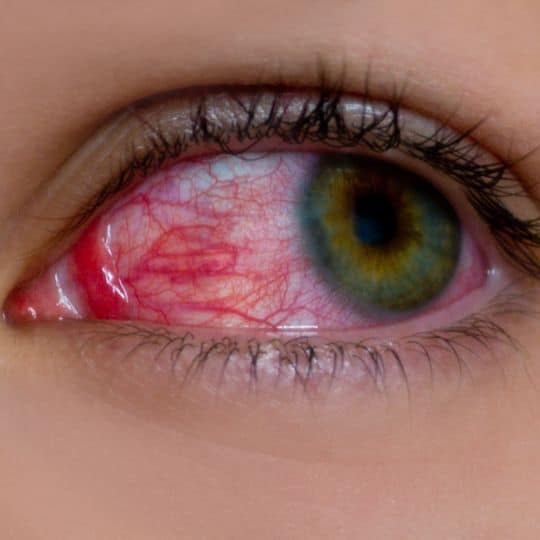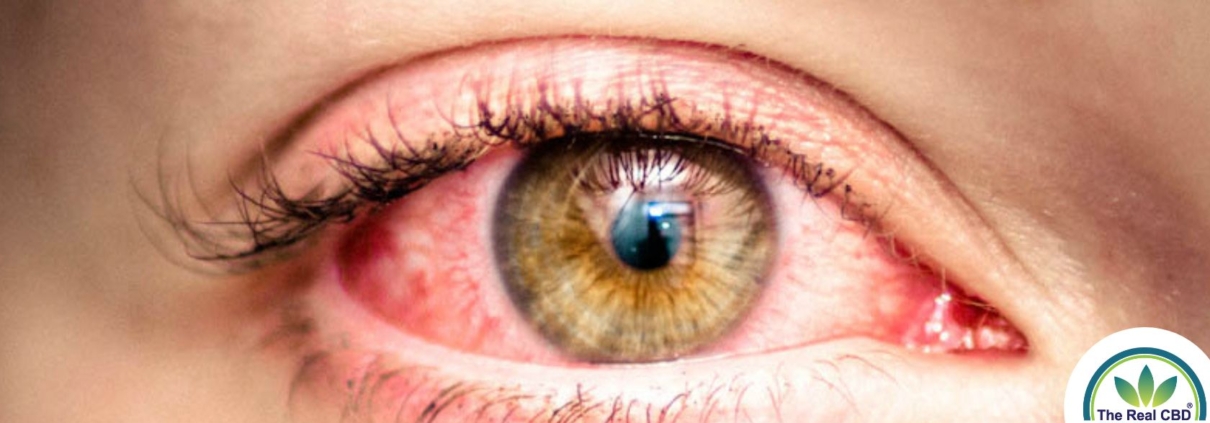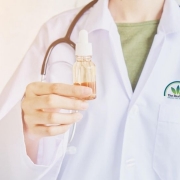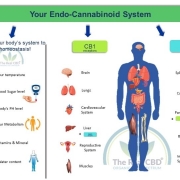Does CBD cause Red Eyes?
Estimated reading time: 9 minutes
Introduction
CBD has gained immense popularity in recent years for its potential health benefits. However, along with the positive aspects, questions and concerns about potential side effects have also emerged. One such query that frequently arises is whether CBD causes red eyes. In this article, we dig into this topic to provide clarity
and insights.
What is CBD?

CBD, which stands for “cannabidiol,” is a natural substance that comes from the cannabis plant. It is a type of cannabinoid that is found in weed. CBD is different from THC (tetrahydrocannabinol) in that it is not psychoactive. This means that CBD does not make you feel “high” like THC does. CBD is known for having possible therapeutic effects, and its possible health and fitness benefits have brought it a lot of attention.
What is Red Eyes?

“Red eyes” refer to a condition where the blood vessels in the whites of the eyes, known as the sclera, become dilated and appear visibly reddened. This reddish appearance can give the eyes a bloodshot or irritated look. Red eyes are a common occurrence and can result from a variety of factors, including:
Irritants:
Exposure to irritants like smoke, pollen, dust, or pollutants can cause the blood vessels in the eyes to become inflamed and red.
Allergies:
Allergic reactions to substances such as pet dander, pollen, or certain foods can lead to red and itchy eyes due to an immune response.
Dryness:
Insufficient tear production or spending extended periods in environments with low humidity can cause the eyes to become dry and red.
Eye Strain:
Prolonged use of digital devices or reading for extended periods without breaks can strain the eyes, leading to redness.
Infections:
Bacterial or viral eye infections can cause redness, along with symptoms like itching, discharge, and discomfort.
Conjunctivitis:
Commonly referred to as “pink eye,” this contagious inflammation of the conjunctiva (the clear membrane covering the eye) can cause redness and irritation.
Alcohol and Fatigue:
Excessive alcohol consumption and lack of sleep can dilate blood vessels and result in red eyes.
Contact Lenses:
Wearing contact lenses for extended periods, improper care, or using lenses that do not fit properly can lead to eye redness.
Medical Conditions:
Certain medical conditions like glaucoma or uveitis can cause red eyes as a symptom.
The redness occurs because the blood vessels in the eyes expand or dilate in response to various triggers, allowing more blood to flow through them. This increased blood flow causes the whites of the eyes to appear reddened or bloodshot. It's important to identify the underlying cause of red eyes in order to address the issue effectively and seek medical attention if necessary.
The Common Misconception: CBD and Bloodshot Eyes

The connection between cannabis and red eyes lies primarily in the compound THC (tetrahydrocannabinol), which is found in marijuana. When you consume THC, it can lead to the dilation of blood vessels, including those in the eyes, resulting in the classic symptom of red eyes. This phenomenon occurs due to the interaction between THC and cannabinoid receptors in the body.
Cannabinoid receptors are part of the endocannabinoid system, a complex network that plays a role in regulating various physiological processes, including mood, appetite, pain sensation, and more. In the eyes, there are cannabinoid receptors located on blood vessel walls. When THC enters the bloodstream and binds to these receptors, it triggers a vasodilation response – the relaxation and widening of blood vessels.
Because of this vasodilation, blood flows more freely through the blood vessels, causing the blood vessels on the surface of the eye to expand. This increased blood flow is what gives the eyes their reddened appearance, often referred to as “red eyes.” It is important to note that this effect is specific to THC and its interaction with cannabinoid receptors.
In contrast
CBD (cannabidiol), another prominent cannabinoid found in cannabis, does not cause the same vasodilation response. Unlike THC, CBD does not have a significant impact on blood vessels, and therefore does not lead to red eyes.
It is worth mentioning that while red eyes are a well-known side effect of THC consumption, they are not inherently harmful and usually subside as the effects of THC wear off. However, if red eyes are a concern, individuals can consider using products with higher CBD-to-THC ratios or choose strains of cannabis that are lower in THC content. Additionally, using eye drops designed to alleviate redness can help manage this effect if it occurs.
The Science Behind Red Eyes: THC vs. CBD

To better understand why THC induces red eyes while CBD does not, let us explore the science behind it. THC binds to cannabinoid receptors in the eyes, causing blood vessels to dilate and resulting in redness. This effect is not mirrored by CBD, as it interacts differently with these receptors, leading to distinct physiological responses.
More about CBD from our blog:
CBD's Potential Benefits for Eye Health
Rather than causing red eyes, CBD may actually contribute to eye health. Research suggests that CBD possesses anti-inflammatory and antioxidant properties, which could be advantageous for maintaining ocular wellness. Some studies even propose that CBD might aid in managing certain eye conditions due to its potential to alleviate inflammation and oxidative stress.

Anti-Inflammatory Properties:
CBD is known for its anti-inflammatory effects, which could be beneficial for maintaining the health of various structures within the eye. Inflammation is a common factor in various eye conditions, and reducing inflammation may contribute to overall ocular wellness.
Ocular Pressure Regulation:
Elevated intraocular pressure is a risk factor for conditions like glaucoma, which can lead to vision impairment. Some studies suggest that CBD and CBG may help regulate intraocular pressure, potentially offering a protective effect against glaucoma.
Neuroprotection:
CBD's potential as a neuroprotective agent has garnered attention. This property might be relevant to eye health, as it could contribute to safeguarding retinal cells from damage caused by conditions like diabetic retinopathy.
Antioxidant Effects:
Oxidative stress is linked to various eye diseases, including age-related macular degeneration. CBD's antioxidant properties may counteract oxidative damage, potentially supporting eye health by protecting against cellular damage.
Dry Eye Relief:
CBD's anti-inflammatory and moisturizing properties could potentially offer relief to individuals suffering from dry eyes. By reducing inflammation and promoting tear production, CBD may help alleviate discomfort associated with dry eye syndrome.
Retinal Health:
The retina is crucial for vision, and its health is paramount. CBD's anti-inflammatory and antioxidant properties could contribute to maintaining retinal integrity and function, potentially benefiting overall visual health.
WARNING! DO NOT USE CBD OIL DIRECTLY IN THE EYES
It is important to note that while these potential benefits are promising, more rigorous research is needed to fully understand CBD's effects on eye health. Before considering CBD for any specific eye-related concerns, individuals should consult with a qualified healthcare professional to discuss potential benefits and risks.
As the field of CBD research progresses, a clearer picture of its role in supporting eye health may emerge. However, it is crucial to approach any health-related decisions with careful consideration and under the guidance of medical experts.
Ensuring Quality: Choosing the Right CBD Products
When considering CBD usage, it is crucial to opt for reputable and high-quality products. Substandard CBD products might contain traces of THC or other impurities that could potentially lead to unwanted effects. By selecting products from reliable manufacturers and checking third-party lab test results, you can mitigate the risk of any adverse reactions, including red eyes.
Conclusion: Debunking the Myth

In conclusion, the notion that CBD causes red eyes is a misconception. Unlike THC, CBD does not induce blood vessel dilation and the subsequent redness commonly associated with marijuana use. As research into CBD's effects on various aspects of health continues, it is essential to rely on accurate information and credible sources. If you are considering using CBD and have concerns about its potential effects, consulting a healthcare professional can provide personalized guidance tailored to your needs.
Remember, making informed decisions regarding your health is paramount, and with the right knowledge, you can navigate the world of CBD confidently.
FAQ

CBD, or cannabidiol, is a natural compound derived from the cannabis plant. It's a type of cannabinoid that does not cause a “high” like THC and is known for potential health benefits.
No, CBD does not cause red eyes. The redness is typically associated with THC consumption, which dilates blood vessels in the eyes. CBD does not have this effect.
Red eyes from cannabis use are due to THC, another cannabinoid in marijuana. THC binds to receptors in blood vessel walls, causing dilation and increased blood flow, leading to redness.
CBD has potential anti-inflammatory and antioxidant properties that might benefit eye health. Research suggests it could regulate ocular pressure, offer neuroprotection, and support retinal health.
Opt for reputable CBD products from reliable manufacturers. Check third-party lab test results to ensure quality and minimize the risk of unwanted effects or impurities.

I am a certified expert in Medicinal Cannabis. We are all about giving correct and trustworthy information. We know how important it is to learn about CBD and cannabis, which is why we want to be your go-to source for trustworthy information. We help you improve your health by using our knowledge and experience as a starting point.














Leave a Reply
Want to join the discussion?Feel free to contribute!